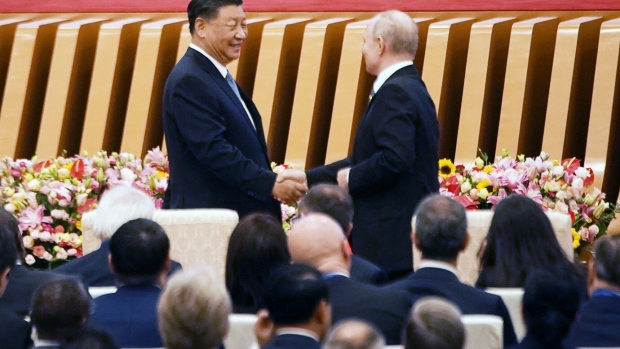Apr 23, 2024
Xi Heads to Belgrade Around Anniversary of NATO Embassy Bombing
, Bloomberg News

(Bloomberg) -- President Xi Jinping is expected to visit Belgrade around the 25th anniversary of the deadly US bombing of the city’s Chinese embassy, spotlighting an event that sparked anti-US protests at home and helped seed Beijing’s mistrust of NATO.
The Chinese leader will stop off in the Balkan nation on or close to May 7, according to people familiar with the preparations, who asked not to be identified because timings haven’t been made public. During the NATO bombing of Yugoslavia in 1999, US missiles killed three Chinese journalists in a strike the White House later called a mistake and blamed on faulty maps.
The Belgrade bombing brought Russia and China closer over anti-American sentiment, forging a partnership that has since strengthened and is causing alarm in the West. President Vladimir Putin’s invasion of Ukraine has put scrutiny on that relationship, with the US and European Union ramping up pressure on Xi to limit Beijing’s support of Moscow’s war machine.
China’s Foreign Ministry didn’t immediately respond to questions about details of Xi’s trip in Europe outside working hours.
By visiting a European nation that hasn’t adopted Western sanctions on Moscow, Xi would make “clear China is going to stand by Russia and deepen their partnership,” said Neil Thomas, a fellow on Chinese politics at the Asia Society Policy Institute’s Center for China Analysis. “The main function of that close relationship is to balance against America.”
Adding to the political theater, Putin — Russia’s longest-serving leader since Soviet dictator Josef Stalin — is set to be inaugurated for his fifth term on May 7.
Xi’s trip to Europe, which includes stops in France and Hungary, comes after German Chancellor Olaf Scholz this month urged the Chinese leader to persuade Putin to end his “insane” war. The European Union’s top diplomat in Asia said Beijing’s support for the Russian leader is a “big issue” that threatens ties with the bloc.
Secretary of State Antony Blinken is set to voice similar concerns in Beijing this week, as the US drafts sanctions aimed at Chinese banks aiding Russia’s military, according to the Wall Street Journal.
After Putin launched his full-scale invasion of Ukraine in 2022, Chinese officials publicly referred to the Belgrade bombing multiple times, as Xi’s government signaled solidarity with Russia’s position that NATO aggression on its borders necessitated the war. Beijing mentioned the attack again in recent weeks.
Geng Shuang, China’s deputy ambassador to the United Nations, referenced the embassy bombing in March, calling it “a flagrant violation of China’s sovereignty” at a UN Security Council meeting. This month, he invoked the incident when condemning the attacks on Iran’s embassy in Syria.
Thousands of demonstrators across China descended on the embassies and consulates of NATO member states after the bombing, with some burning American flags. While then-US President Bill Clinton issued a formal apology days later, suspicion lingers among some in China that the incident was intentional. The strike took place during NATO’s bombing campaign, which prompted Belgrade to pull its forces out of Kosovo.
“The bombing continues to be seen by many people in the People’s Republic of China as something that was done on purpose despite efforts to explain by the US and NATO that it was an accident,” said Chong Ja Ian, an associate professor of political science at the National University of Singapore, using China’s full name.
As Beijing finds itself increasingly isolated within the US-led system, it has joined hands with Moscow trying to build sway with alternative blocs. NATO has condemned China and Russia’s partnership as an affront to the rules-based international order and branded China a “systemic challenge” to the alliance.
Ties between China and Serbia, which is not an EU member, have strengthened under Xi, even as China’s broader relationship with Europe frays over human-rights issues and trade spats. Serbian President Aleksandar Vucic told Chinese state media in February that “Taiwan is China,” backing Beijing’s claim over the self-ruled island.
Xi last visited Serbia in 2016, when he became China’s first leader to pay his respects at the site of the former embassy. He also praised both countries’ citizens for their “fearlessness against hegemonic power,” according to state media reports of the trip.
The world’s largest economies have engaged in a flurry of high-level diplomatic exchanges in recent weeks, designed to put guardrails on the US-China relationship during an American election season where Beijing is a top target.
Still, Xi might want to remind domestic audiences that he remains tough on Washington, said Dongshu Liu, an assistant professor specializing in Chinese politics at the City University of Hong Kong.
“It may also be a signal to the US,” he added, “Telling them: We want to make a compromise, but still we’ll show some muscle if necessary.”
(Adds comments from EU’s top diplomat in Asia in seventh paragraph.)
©2024 Bloomberg L.P.








